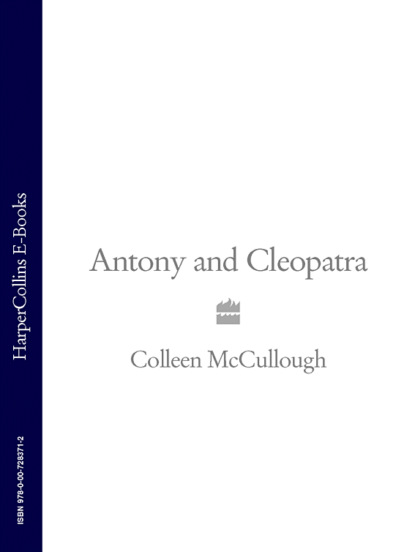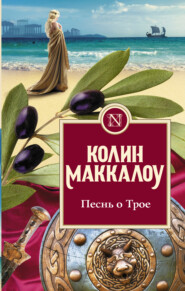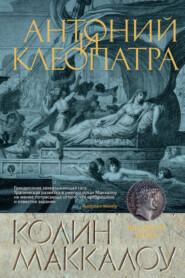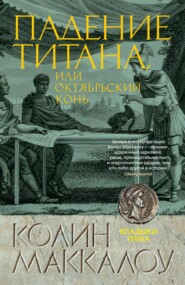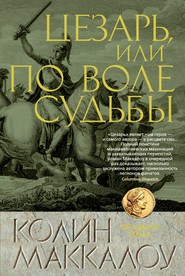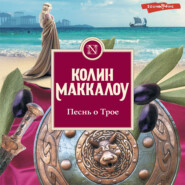По всем вопросам обращайтесь на: info@litportal.ru
(©) 2003-2024.
✖
Antony and Cleopatra
Автор
Год написания книги
2019
Настройки чтения
Размер шрифта
Высота строк
Поля
The outcome actually depended upon the ring of great armies fencing Italia in – armies commanded by Antony’s best marshals, men who were his friends as well as his political adherents. Gnaeus Asinius Pollio held Italian Gaul with seven legions; in Further Gaul across the Alps sat Quintus Fufius Calenus with eleven legions; while Publius Ventidius and his seven legions sat in coastal Liguria.
By now it was autumn. Antony was in Athens, not far away, enjoying the entertainments this most sophisticated of cities had to offer. Pollio wrote to him, Ventidius wrote to him, Calenus wrote to him, Plancus wrote to him, Fulvia wrote to him, Lucius wrote to him, Sextus Pompey wrote to him, and Octavian was writing to him every single day. Antony never answered any of these letters – he had better things to do. Thus – as Octavian for one realized – Antony missed his great chance to crush Caesar’s heir permanently. The veterans were mutinous, no one was paying taxes, and all Octavian could scrape up were eight legions. Every main road from Bononia in the north to Brundisium in the south reverberated to the rhythmic thud of hobnailed legionary caligae, most of them belonging to Octavian’s avowed enemies. Sextus Pompey’s fleets controlled both the Tuscan Sea to Italia’s west and the Adriatic Sea to Italia’s east, cutting off the grain supply from Sicilia and Africa. Had Antony hoisted his bulk off his plush Athenian couch and led all these elements in an outright war to squash Octavian, he would have won easily. But Antony chose not to answer his letters and not to move. Octavian breathed a sigh of relief, while Antony’s own people assumed that Antony was too busy having a good time to bother with anything beyond pleasure.
But in Alexandria, reading her reports, Cleopatra fretted and fumed, considered writing to Antony to urge him into an Italian war. That would really remove the threat from Egypt! In the end she didn’t write; had she, it would have been a wasted effort.
Lucius Antonius marched north on the Via Flaminia to Perusia, a magnificent town perched high on a flat-topped mountain in the middle of the Apennines. There he inserted himself and his six legions within Perusia’s walls and waited to see not only what Octavian would do, but also what Pollio, Ventidius and Plancus would do. It never occurred to him that the latter three wouldn’t march to his rescue – as Antony’s men, they had to!
Octavian had put his spiritual brother Agrippa in command – a shrewd decision; when the two very young men concluded that neither Pollio and Ventidius nor Plancus were going to rescue Lucius, they erected massive siege fortifications in a ring all the way around Perusia’s mountain. No food could reach the town and, with winter coming on, the water table was low, and lowering.
Fulvia sat in Plancus’s camp and railed at the perfidy of Pollio and Ventidius, clustered miles away; she also railed in person at Plancus, who put up with it because he was in love with her. Her state of mind was alarmingly unstable: one moment frenzied tantrums, the next bursts of energy recruiting more men. But what ate at her most was a new hatred of Octavian. The supercilious pup had sent his wife, Fulvia’s daughter Clodia, back to her mother still virgo intacta. What was she going to do with a skinny girl who did nothing but weep and refuse to eat? In awar camp? Worst of all, Clodia insisted that she was madly in love with Octavian, and blamed Octavian’s rejection on her mother.
By late October, Antony likened himself to Aetna just before an eruption. His colleagues felt the tremors and tried to avoid him, but that was not possible.
‘Dellius, I’m going to winter in Alexandria,’ he announced. ‘Marcus Saxa and Caninius can stay with the troops at Ephesus. Lucius Saxa, you can come with me as far as Antioch – I’m making you governor of Syria. There are two legions of Cassius’s troops in Antioch, they’ll be enough for your needs. You can start by making the cities of Syria understand that I want tribute. Now, not later! Whatever a place paid Cassius, it will pay to me. For the moment I’m not changing my dispositions elsewhere – Asia Province is quiet, Censorinus is coping in Macedonia, and I can’t see the need for a governor in Bithynia.’ He stretched his arms above his head exultantly. ‘A holiday! The New Dionysus is going to have a proper holiday! And what better place than at the court of Aphrodite in Egypt?’
He didn’t write Cleopatra a letter either. She knew that he was coming only through her agents, who managed to give her two nundinae of notice. In those sixteen days she sent ships out in search of fare that Egypt did not stock, from the succulent hams of the Pyreneae to huge wheels of cheese. Though it wasn’t usually on the menu, the palace kitchens could produce garum for flavoring sauces, and several breeders of suckling pigs for Roman residents of the city found their entire piggeries bought out. Chickens, geese, ducks, quails and pheasants were rounded up, though at this time of year there would be no lamb. More importantly, the wine had to be as good as plentiful; Cleopatra’s court hardly touched it, and Cleopatra herself preferred Egyptian barley beer. But for the Romans it must be wine, wine, wine.
Rumors floated around Pelusium and the Delta that Syria was restless, although no one seemed to have concrete evidence as to the nature of the problem. Admittedly the Jews were in a ferment; when Herod had returned from Bithynia a tetrarch, there were howls from both sides of the Sanhedrin, Pharisee and Sadducee; that his brother Phasael was also a tetrarch didn’t seem to matter as much. Herod was hated, Phasael tolerated. Some Jews were intriguing to spill Hyrcanus from the throne in favor of his nephew, a Hasmonaean prince named Antigonus; or, failing success, at least to strip Hyrcanus of the high priesthood and give that to Antigonus.
But with Mark Antony due to arrive any day, Syria didn’t get the attention from Cleopatra that it deserved. It was a matter of some urgency only because Syria was right next door.
What preoccupied Cleopatra most was a crisis that hinged on her son. Cha’em and Tach’a had been instructed to take Caesarion to Memphis and keep him there until Antony left.
‘I will not go,’ Caesarion said very calmly, chin up.
They were far from alone, which annoyed her. So she answered curtly. ‘Pharaoh orders it! Therefore you will go.’
‘I too am Pharaoh. The greatest Roman left alive after my father was murdered is to visit us, and we will receive him in state. That means Pharaoh must be present in both incarnations, male and female.’
‘Don’t argue, Caesarion. If necessary, I’ll have you taken to Memphis under guard.’
‘That will look good to our subjects!’
‘How dare you be insolent to me!’
‘I am Pharaoh, anointed and crowned. I am son of Amun-Ra and son of Isis. I am Horus. I am the Lord of the Two Ladies and the Lord of the Sedge and Bee. My cartouche is above yours. Without going to war against me, you cannot deny me my right to sit on my throne. As I will when we receive Marcus Antonius.’
The sitting room was so silent that every word mother and son uttered rang around the gilded rafters. Servants stood on duty in every inconspicuous corner; Charmian and Iras were in attendance on the Queen, Apollodorus stood in his place, and Sosigenes sat at a table poring over menus. Only Cha’em and Tach’a were absent, happily planning the treats they were going to give their beloved Caesarion when he arrived at the precinct of Ptah.
The child’s face was set mulishly, his blue-green eyes hard as polished stones. Never had his likeness to Caesar been so pronounced. Yet his pose was relaxed, no clenched fists or planted feet. He had said his piece; the next move was Cleopatra’s.
Who sat in her easy chair with mind spinning. How to explain to this obstinate stranger that she acted for his own good? If he remained in the Royal Enclosure he was bound to be exposed to all manner of things beyond his ken – oaths and profanities, crudeness and coarseness, vomiting gluttons, people too hot with lust to care that they coupled on a couch or against a wall; goings-on that carried the seeds of corruption, vivid illustrations of a world she had resolved her son would never see until he was old enough to cope with it. Well she remembered her own years as a child in this selfsame palace, her dissolute father pawing his catamites, exposing his genitals to be kissed and sucked, dancing about drunkenly playing his silly pipes at the head of a procession of naked boys and girls. While she cowered out of sight and prayed he would not find her and have her raped for his pleasure. Killed, even, like Berenice. He had a new family by his young half-sister; a girl by his Mithridatid wife was expendable. So the years she had spent in Memphis with Cha’em and Tach’a lived in her memory as the most wonderful time of her whole life: safe, secure, happy.
The feasts in Tarsus had been a fairly good example of Mark Antony’s way of life. Yes, he himself had remained continent, but only because he had to duel with a woman who was also a monarch. About the conduct of his friends he was indifferent, and some of them had disported themselves shamelessly.
But how to tell Caesarion that he wouldn’t – couldn’t – be here? Instinct said that Antony was going to forget continence, play the role of Neos Dionysus wholeheartedly. He was also her son’s cousin. If Caesarion were in Alexandria, they couldn’t be kept apart. And obviously Caesarion dreamed of meeting the great warrior, not understanding that the great warrior would present in the guise of the great reveler.
So the silence persisted until Sosigenes cleared his throat and pushed his chair back to stand.
‘Your Majesties, may I speak?’ he asked.
Caesarion answered. ‘Speak,’ he commanded.
‘Young Pharaoh is now six, yet he is still under the care of a palace full of women. Only in the gymnasium and the hippodrome does he enter a world of men, and they are his subjects. Before they can talk to him, they must prostrate themselves. He sees nothing odd in this: he is Pharaoh. But with the visit of Marcus Antonius, young Pharaoh will have a chance to associate with men who are not his subjects, and who will not prostrate themselves. Who will ruffle his hair, cuff him gently, joke with him. Man to man. Pharaoh Cleopatra, I know why you wish to send young Pharaoh to Memphis, I understand—’
Cleopatra cut him short. ‘Enough, Sosigenes! You forget yourself! We will finish this conversation after young Pharaoh has left the room – which he will do now!’
‘I will not leave,’ said Caesarion.
Sosigenes continued, visibly shaking in terror. His job – also his head – was in peril, but someone had to say it. ‘Your Majesty, you cannot send young Pharaoh away, either now to finish this, or later to shield him from the Romans. Your son is crowned and anointed Pharaoh and King. In years he may be a child, but in what he is, he is a man. It is time that he associated freely with men who do not prostrate themselves. His father was a Roman. It is time he learned more of Rome and Romans than he could as a babe during the time when you lived in Rome.’
Cleopatra felt her face afire, wondered how much of what she experienced was written on it. Oh, bother the wretched boy, to take his stand so publicly! He knew how servants gossiped – it would be all over the palace in an hour, all over the city tomorrow.
And she had lost. Everybody present knew it.
‘Thank you, Sosigenes,’ she said after a very long pause, ‘I appreciate your advice. It is the right advice. Young Pharaoh must stay in Alexandria to mingle with the Romans.’
The boy didn’t whoop with glee or caper about. He nodded regally and said, gazing at his mother with expressionless eyes, ‘Thank you, Mama, for deciding not to go to war.’
Apollodorus shooed everyone out of the room, including young Pharaoh; as soon as she was left alone with Charmian and Iras, Cleopatra burst into tears.
‘It had to happen,’ said Iras, the practical one.
‘He was cruel,’ said Charmian, the sentimental one.
‘Yes,’ said Cleopatra through her tears, ‘he was cruel. All men are, it is their nature.’ She mopped her face. ‘I have lost a tiny fraction of my power – he has wrested it from me. By the time he is twenty, he will have all the power.’
‘Let us hope,’ said Iras, ‘that Marcus Antonius is kind.’
‘You saw him in Tarsus. Did you think him kind then?’
‘Yes, when you let him. He was uncertain, so he blustered.’
‘Isis must take him as her husband,’ said Charmian, sighing, eyes misty. ‘What man could be unkind to Isis?’
‘To take him as husband is not to yield power. Isis will gather it,’ said Cleopatra. ‘But what will my son say when he realizes that his mother is giving him a stepfather?’
‘He will take it in his stride,’ said Iras.
Antony’s flagship, an overlarge quinquereme high in the poop and bristling with catapults, was bidden tie up in the Royal Harbor. And there, waiting on the wharf under a golden canopy of state stood both incarnations of Pharaoh, though not clad in pharaonic regalia. Cleopatra wore a simple robe of pink wool and Caesarion a Greek tunic, oatmeal trimmed with purple. He had wanted to wear a toga, but Cleopatra had told him that no one in Alexandria could show the palace seamstresses how to make one. She thought that the best way to avoid giving Caesarion the news that he wasn’t allowed to wear a toga because he wasn’t a Roman citizen.
If it had been Caesarion’s ambition to steal his mother’s thunder, he succeeded; when Antony strode down the gangplank onto the wharf, his eyes were fixed on Caesarion.
‘Ye gods!’ he exclaimed as he reached them, ‘Caesar all over again! Boy, you’re his living image!’
Knowing himself tall for his age, Caesarion felt suddenly dwarfed; Antonius was huge! None of which mattered when Antony bent down and lifted him up effortlessly, settled him on a left arm bulging with muscles beneath many folds of toga. Behind him Dellius was beaming; it was left to him to greet Cleopatra, walk at her side up the path from the jetty, looking at the pair well in front, the boy’s golden head thrown back as he laughed at some Antonian jest.
‘They have taken to each other,’ Dellius said.





